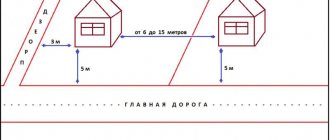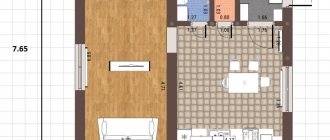As a result of amendments to the Housing Code of the Russian Federation, persons who are not low-income, however, with an income that does not provide the opportunity to purchase housing through personal savings or on credit, have the opportunity to rent housing in rental houses.
Such housing can be applied for by citizens who are in line for social rent and citizens whose income exceeds the minimum, but does not allow them to count on a mortgage.
A rental house is a residential building that is the property of one person, intended to be rented out for the purpose of living. The basis for the use and ownership of real estate in a rented house is a residential lease agreement . On the territory of Russia, there are two types of rental housing: social rental houses and commercial rental houses.
Rented commercial house
A commercial rental house is a residential premises owned by an individual or legal entity. Renting such housing occurs by concluding a rental agreement for residential premises. This type of agreement, in contrast to contracts for social rental housing and rental of social housing, has a number of advantages.
A residential lease agreement can be concluded at any time without observing any kind of priority. One of the parties to the agreement can be any citizen, including a foreign one, that is, there are no conditions provided for the rental of social housing. The term of the contract can be either clearly defined or subject to extension. In this case, the agreement can be short-term in nature and concluded for several months, or it can be long-term in nature and concluded for several years.
The rights of the parties and their obligations for this agreement do not have a set form. When renting private housing, the landlord stipulates the conditions for temporary use of such housing: payment and types of payment, current and major repairs of a residential building, conditions for the use of utility rooms, etc. Another significant advantage of such hiring is the absence of limits on the provided living space. But the lessor pursues the goal of obtaining benefits. Therefore, the housing fee will include more than just the cost of use.
They want to provide the newlyweds with social housing
Deputies believe that solving the housing issue will strengthen the marriages of Russians.
Deputy Chairman of the State Duma Committee on Health Protection Nikolai Govorin proposes to provide social housing to newlyweds, reports DEITA.RU news agency with reference to the Parliamentary Gazette. The deputy is puzzled by the sad statistics of divorces in Russia - only in Moscow and St. Petersburg there are 650-700 divorces per thousand marriage registrations. According to the politician, improving living conditions should strengthen the institution of marriage.
Govorin suggests the following. Every young couple who gets married should be given social housing, and if the spouses manage to become parents twice during their stay in this apartment, then this housing can be privatized. The politician called mortgage loans, which young families have to get involved in, bondage.
The deputy also proposes to ban television channels and media “from promoting an idle lifestyle,” and in schools he considers it necessary to introduce discipline related to the culture of family and family life.
The idea of social housing certainly sounds tempting. However, if we omit the question of where the state will find money for its construction, if it still cannot provide them with the same orphans, then we can briefly consider another: the mass distribution of social housing involves the construction of new neighborhoods, which, as a rule, turn out to be very inconvenient for life. In addition to the fact that they appear on the outskirts of the city and have very poor transport accessibility, they usually lack full-fledged recreational areas, there are not enough social facilities and shops. It turns out that such neighborhoods are especially inconvenient for young parents: if the area has problems with kindergartens, clinics and green areas, then most likely the family will try to move somewhere closer before giving birth to a child. At the same time, they will not be able to sell social housing and get money to invest in a new apartment; they still cannot avoid that same bondage.
Here you can recall the program for the renovation of dilapidated housing in Moscow. People who had apartments in old but well-developed neighborhoods were moved to new buildings near the Moscow Ring Road. It came down to forced resettlement through the courts - Muscovites were not tempted by the prospect of moving to remote areas.
Also, young people are not too attracted to the “Far Eastern Mortgage”.
Who is eligible for social housing?
Not all Russian citizens can receive such housing, but only certain people who meet the conditions for concluding this agreement. All citizens belonging to such a group are registered in Art. 49 Residential Complex of Russia. And all the necessary requirements for recognizing people as needing to improve their living conditions or obtain housing under a contract are approved in Art. 51 residential complex of Russia.
These groups of citizens include:
Poor people, officially recognized as such and in need of housing.- Orphans or minors left without parental care.
- People living in emergency premises that are not suitable for living in and cannot be repaired.
- People suffering from severe forms of chronic illnesses whose family members cannot live together with them. The list of all diseases included in this list is approved by law (clause 4, part 1, article 51 of the Housing Code of Russia).
The last three groups of citizens may have the right to receive living space under such an agreement, regardless of the queue.
And the conditions for recognizing low-income people as needing improved living conditions are as follows:
- If a person or members of his family do not rent housing under a similar agreement already concluded with the state.
- If a person or members of his family are still tenants of such housing, but it has an area smaller than that established by the standards. Most often this is associated with the arrival of a new family member (adoption, birth). Then, in recalculation of the area per person required by the standards, sq. m. meters may not be enough.
- They live in residential premises that do not meet all living standards described in the Russian Housing Code.
The following special categories of citizens can also apply for housing from the state fund:
- veterans of the Great Patriotic War,
- people left homeless due to disasters and natural disasters,
- military personnel who received injuries or mutilations during their service,
- liquidators of the consequences of the accident at the Chernobyl nuclear power plant, who received disability as a result,
- people belonging to disability groups I and II.
Participants of the agreement
There are two people involved in the process of leasing social housing:
- landlord - the one who provides an apartment for rent, that is, for living in it,
- tenant - the one who rents an apartment for occupancy.
Important! In order for a person to move into an apartment, they must sign an agreement. It is regulated by the provisions of Russian housing standards.
The lessor is:
- owner of residential premises that are state or local property,
- any state or local authority representing the owner,
- another entity acting on behalf of the lessor.
When agreeing on social The hiring period is not considered to be limited. If the terms of the agreement or the grounds on which the apartment was provided for social rent change, then this fact does not oblige its termination.
Social housing for the poor
Article 40 of the Constitution of the Russian Federation speaks of the right for low-income citizens to receive housing owned by state or municipal funds free of charge, or at a price affordable to them.
But for this, the family must have low-income status.
Which family fits the definition of low-income?
The housing complex of the Russian Federation does not consider those who have a small income to be poor. In this issue, the main point that is paid attention to is whether the family has the opportunity to purchase housing that can provide each family member with square meters accepted by the provision norm for the region. In this case, they rely on the average price of residential premises in a given region.
How this happens in practice: the total family income is compared with the total market value of all property owned by the family. If the resulting property value is lower than the price of the apartment to be purchased, the family will receive low-income status.
Public offer to conclude a charitable donation agreement
This public offer, hereinafter referred to as the “Offer”, is an offer by the Charitable Foundation for Assistance to Children and Their Families “Good Home”, hereinafter referred to as the “Beneficiary”, represented by the General Director Yulia Evgenievna Romeiko, acting on the basis of the Charter, to conclude with anyone who will respond to the Offer, hereinafter referred to as the “Charity”, a charitable donation agreement, hereinafter referred to as the “Agreement”, on the conditions specified below:
1. General Provisions
1.1. The proposal to conclude this Agreement is addressed to an indefinite number of persons and is a public offer in accordance with paragraph 2 of Article 437 of the Civil Code of the Russian Federation.
1.2. The Offer comes into force on the day following the day it is posted on the Beneficiary’s website on the Internet at the address: https://do-dom.ru/, hereinafter referred to as the “Site”.
1.3. The offer is unlimited. The Beneficiary has the right to cancel the Offer at any time.
1.4. Changes and additions may be made to the Offer, which come into force on the day following the day they are posted on the Site. The invalidity of one or more terms of the Offer does not entail the invalidity of all other terms of the Offer.
1.5. The place of placement and conclusion of this Agreement is considered to be the location of the Beneficiary, namely the city of Moscow, Russian Federation.
1.6. The date of conclusion of this Agreement is considered the date of acceptance of the Offer in accordance with clause 4.6. actual agreement. An individual or legal entity can accept the Offer and thereby conclude an Agreement with the Beneficiary.
1.7. The Beneficiary has the right to enter into charitable donation agreements in a different manner and (or) on other terms than those provided for in the Offer, for which any interested person has the right to contact the Beneficiary to conclude an appropriate agreement.
2. Subject of the agreement
2.1. Under this Agreement, the Benefactor, as a charitable donation, transfers his own funds to the Beneficiary free of charge in any way convenient for the Benefactor, specified in clause 4.2 of this Agreement, and the Beneficiary accepts the charitable donation and uses it to carry out charitable activities in accordance with the Charter of the Beneficiary.
2.2. The fact of transfer of a charitable donation indicates the Benefactor’s full agreement with the terms of this Agreement.
2.3. By accepting the terms of this Agreement, the Benefactor confirms the voluntary, gratuitous nature of the charitable donation and guarantees the Beneficiary that the funds transferred as a charitable donation belong to the Benefactor by right of ownership, are not encumbered by the rights of third parties and their transfer does not violate the rights of third parties and the norms of the current legislation of the Russian Federation .
2.4. The implementation by the Philanthropist of actions under this Agreement is recognized as a charitable donation in accordance with Article 582 of the Civil Code of the Russian Federation.
3. Activities of the Beneficiary
3.1. The purpose of the Beneficiary's activities is the formation of property on the basis of voluntary property contributions and other proceeds not prohibited by law, directed to:
· providing material, social, and psychological assistance to citizens aged 0 to 23 years with oncological, hematological and other serious diseases.
· social support and protection of citizens, including improving the financial situation of low-income citizens, social rehabilitation of disabled people and other persons who, due to their physical or intellectual characteristics, or other circumstances, are not able to independently realize their rights and legitimate interests;
· promoting the protection of motherhood, childhood and paternity;
· promoting activities in the field of prevention and health protection of citizens, as well as promoting a healthy lifestyle, improving the moral and psychological state of citizens;
· promoting voluntary (volunteer) activities.
3.2. The Beneficiary's activities do not have the goal of making a profit; the Fund does not distribute the profits received among participants.
3.3. The beneficiary publishes information about its activities and the results of its activities on the Site and in other open sources.
4. Making a charitable donation
4.1. The benefactor independently determines the amount of the charitable donation
and enters it in any convenient way indicated on the Site, under the terms of this
Agreement.
4.2. The Benefactor has the right to transfer a charitable donation to the Beneficiary in any of the following ways:
· transfer a charitable donation by payment order using the Beneficiary’s details specified in clause 7 of this Agreement, including through your personal account on the website of the Benefactor’s bank;
· use the electronic payment system on the Site by making a one-time charitable donation using a bank card or electronic money;
· use the electronic payment system on the Site and make a charitable donation in the form of a recurring payment from a bank card or electronic money (recurrent or regular payments are transactions with an automated payment process and a fixed frequency for a given amount made in favor of the Beneficiary);
· write off funds from your mobile phone account or send an SMS message to short number 3434 with the word “HOUSE 500” or to short number 3141 “HOUSE 500” where 500 is the amount of a charitable donation, can be from 10 to 15,000 rubles;
· make a charitable donation in cash to the Beneficiary's cash desk;
· make a charitable donation in cash into boxes for collecting charitable donations installed by the Beneficiary in public places;
· make a donation by any other methods indicated on the Beneficiary’s Website.
4.3. If the method of transfer of a charitable donation chosen by the Benefactor does not allow specifying the “purpose of payment”, the Benefactor has the right to clarify the purposes of the charitable donation in another way by sending a corresponding written request through a special form on the Site or in any other convenient way specified in the “contacts” section on the Site.
4.4. When transferring a charitable donation, in order to correctly identify the payer, the Benefactor can indicate his contact information: full name, email address, postal address, telephone number, date of birth and other information.
4.5. The performance by the Benefactor of any of the actions provided for in clause 4.2 of this Agreement is considered confirmation of agreement with the terms of this Agreement - acceptance of this Offer in accordance with Part 3 of Article 438 of the Civil Code of the Russian Federation.
4.6. The date of acceptance of this Offer is the date of receipt of a charitable donation from the Benefactor to the Beneficiary's current account, or to the Beneficiary's account in the payment system, or the date of making a charitable donation to the Beneficiary's cash desk, or the date of sending a short text message (SMS), or the date of withdrawal of charitable donations by authorized representatives of the Beneficiary donations from the charity donation box.
5. Rights and obligations of the parties
5.1. The Beneficiary is obliged to use what is received under this Agreement
charitable donation in accordance with the current legislation of the Russian Federation and within the framework of its statutory activities.
5.2. The beneficiary is required to publish reports on the intended use of charitable donations received by him during the calendar year. Reports are published on the Beneficiary's website and the Ministry of Justice website no later than April 15 of the year following the reporting year.
5.3. The benefactor has the right, at his own discretion, to choose the object of assistance by indicating the appropriate purpose of payment in the “purpose of payment” field when transferring a charitable donation. The current list of charitable programs, the names and surnames of people in need of help are published on the Website, in the Beneficiary’s printed materials, social networks and newsletters of the Beneficiary, and in the media.
5.4. When receiving a charitable donation for a specific person, for a specific program or project, the Beneficiary is obliged to use this charitable donation in accordance with its intended purpose. If the amount of a charitable donation exceeds the established amount, then the Beneficiary
has the right to use funds received in excess of the established amount for the statutory purposes of the Beneficiary.
5.5. When receiving a charitable donation without indicating the appropriate purpose for payment, as well as with a purpose that does not allow one to clearly identify the recipient of the assistance, a charitable program or project, the Beneficiary has the right to independently specify its use for statutory purposes.
5.6. If it is impossible to use a charitable donation for the purposes determined by the Benefactor (death of the recipient of assistance, completion of a charitable program, refusal of the official representatives of the needy person to collect), the Beneficiary has the right to use the charitable donation for statutory purposes.
5.7. The benefactor has the right to refuse a charitable donation in the form of a recurring payment. In this case, the Benefactor must send a written notification through a special form on the Site, or by email [email protected]. The Beneficiary is obliged to take the necessary measures within 14 (fourteen) calendar days and cancel the Benefactor’s recurring payment.
5.8. By making a charitable donation, the Benefactor agrees that, in accordance with Federal Law No. 135 of August 11, 1995 (as amended on December 18, 2018) “On Charitable Activities and Volunteering (Volunteering),” he has the right to use part of the funds received for financing of administrative expenses. At the same time, the Beneficiary does not have the right to use more than 20 percent of the financial resources spent during the financial year to pay for administrative and managerial personnel.5.9. The benefactor has the right to receive information about the use of his charitable donation. To exercise this right, the Beneficiary has the right to post on the Site:
· information about the amounts of charitable donations received by the Beneficiary, indicating the name and patronymic or initials of the Benefactor, the full or partial name of the organization, part of the phone number of the Benefactor. The data of the Philanthropist - an individual posted on the website should not provide an opportunity for unambiguous identification of personal data by third parties;
· report on the intended use of charitable donations received;
5.10. The Benefactor has the right to ask the Beneficiary to indicate his charitable donation on the website as anonymous.
4.11. The Benefactor has the right to request from the Beneficiary confirmation of the intended use of the charitable donations received.
4.12. The Beneficiary does not bear any other obligations to the Benefactor other than the obligations specified in this Agreement.
6. Consent to the processing of personal data
and newsletter
6.1. By accepting the terms of this Agreement, the Benefactor, acting freely, in his own will and in his own interest, gives the Beneficiary and third parties (based on an agreement with the Beneficiary) consent to the processing of personal data specified when making a charitable donation: last name, first name, patronymic, address of place residence, email address, postal address, telephone number, date of birth, bank details.
6.2. The Beneficiary carries out activities in the field of processing and protecting the personal data of the Beneficiary in order to fulfill the terms of this Agreement, as well as to inform the Beneficiary about the activities of the Beneficiary. Processing of personal data includes: collection, recording, systematization, accumulation, storage, clarification (updating, changing), extraction, use, transfer (distribution, provision, access), depersonalization, blocking, deletion, destruction of any information related to personal data from the Benefactor.
6.3. The Beneficiary processes personal data on the basis of the Federal Law of July 27, 2006 No. 152-FZ “On Personal Data”, based on the requirements of the current legislation of the Russian Federation and in accordance with the Policy regarding the processing of personal data approved by the Beneficiary (hereinafter referred to as the Policy). The Policy is freely available on the Beneficiary’s Website.
6.4. The Beneficiary does not disclose to a third party the personal data provided by the Benefactor without his written consent, except in cases where this information is required by government bodies having the appropriate powers, as well as in cases where the Beneficiary has entered into an agreement with a third party in compliance with the terms of Federal Law dated July 27, 2006 No. 152- Federal Law “On Personal Data”
6.5. The Benefactor’s consent to the processing of his personal data is valid indefinitely, and the storage period for the Benefactor’s personal data is unlimited.
6.6. The donor has the right to withdraw his consent at any time by sending a written notification through a special form on the Site, or by email marked “Withdrawal of consent to the processing of personal data.” The Beneficiary, having received from the Benefactor a written notification of the withdrawal of consent to the processing of personal data, is obliged to stop processing it within 14 (fourteen) calendar days.
6.7. The Benefactor also gives the Beneficiary consent to send him information about current charitable programs, people in need of help, upcoming events, and reports on the Beneficiary’s activities. Information is provided to the Beneficiary by sending letters to his email or postal address, as well as via SMS messages, Viber messages, WhatsApp messages (newsletters).
6.8. The donor has the right to refuse to send information to him at any time by sending a written notification through a special form on the Site, or by email marked “Withdrawal of consent to send information.” The Beneficiary, having received from the Benefactor a written notification of the withdrawal of consent to send information, is obliged to take the necessary measures within 14 (fourteen) calendar days and cancel the sending of information.
7. Other conditions
7.1. In the event of disputes and disagreements between the Benefactor and the Beneficiary under this Agreement, they will, if possible, be resolved through negotiations. If it is impossible to resolve a dispute through negotiations, disputes and disagreements may be resolved in accordance with the current legislation of the Russian Federation in the courts at the legal address of the Beneficiary.
7.2. The Beneficiary and the Benefactor are released from liability for failure to fulfill or improper fulfillment of obligations under this Agreement if this occurred due to the occurrence of force majeure circumstances, as a result of extraordinary events that cannot be foreseen or prevented.
"Khrushchev" in British
Towards the end of the war, the British government approached architect and MP Sir John Tudor Walters and a group of experts to design housing for the working class. One of these experts, the architect Raymond Unwin, was a representative of the garden city movement in urban planning.
In the final report, experts tried to take into account all aspects, including the health of future residents: “Doctors are unanimous in their opinion that it is extremely important to ensure constant and significant penetration of sunlight into living rooms.” The distance between houses opposite each other was proposed to be at least 70 feet (21.3 meters).
Tudor Walters' report calculated the amount of sunlight needed for one house
Tudor Walters' report calculated the amount of sunlight needed for one house
On one acre (4000 m2) of urban land there should be no more than 12 houses, rural - no more than eight.
One of the most important issues is the presence of a separate room, a “salon,” in addition to the living room and kitchen.
“The desire for a separate salon or third room is very common among urban and rural workers,” the report said.
“Gentlemen, the experts decided that the salon room was necessary in order to provide older family members with a place where they could calmly and with dignity conduct conversations with friends. And so that children do not interrupt conversations with their presence. Also such a room is required so that if there is a sick person in the house, he can recover in peace and quiet.”
Ceiling heights were rated at an average of 8 feet (2.44 metres), just above the current British standard of 2.4 metres.
The area of the smallest house designed (it did not include a salon room) was supposed to be a little more than 800 square feet (74 m2), and the largest - 1100 (102 m2). Even in small houses, the smallest bedroom was 8 x 8 feet.
Walters insisted on minimum standards of comfort. New homes had to have at least one bath and three bedrooms, not counting other rooms.
Becontree in Essex is one of the first social developments in the country. Photo from 1929
Becontree in Essex is one of the first social developments in the country. Photo from 1929
The commission developed several standard development projects that municipal authorities could use as a starting point.
The results of the commission's work were included in the Building and Town Planning Act of Parliament 1919, also known as the Addison Act, named after the Minister of Health. The government provided subsidies to municipal authorities. Local authorities began choosing sites for construction.
What is it and who is entitled to it
There are currently 4 categories of housing in Russia:
- Specialized;
- Private;
- Privatized;
- Municipal.
According to the definition, social housing is housing in which citizens can live, but the ownership of which belongs to the state (or municipality). People live there under a social tenancy agreement. Thus, it can also be called municipal.
Who is eligible for social housing?
To obtain social housing, the applicant must meet the requirements established by law.
First of all, applications from the following categories of citizens are considered:
- military personnel and members of their families;
- orphans;
- WWII veterans;
- persons affected by the accident at the Chernobyl nuclear power plant and those who participated in the liquidation of the consequences of this accident;
- large families;
- citizens living in dilapidated or dilapidated houses;
- people with disabilities (disabled people);
- forced migrants;
- people leaving difficult to live areas of the Far North;
- people suffering from chronic diseases, pathological diseases, diseases that pose a potential danger to others;
- people affected by natural disasters.
Who else has the legal right to live in apartments owned by the municipality?
In addition to the preferential category of citizens, the following are entitled to social housing:
- low-income families (poor);
- families living in premises without amenities (lack of heating, electricity, water, etc.);
- living space for each individual family member is less than indicated in the regional registration form;
- living for a long time on terms of rent or sublease in houses of the municipal housing stock (i.e. citizens who do not have their own real estate, but have the right to reside in Russia).
Construction company LLC "STM"
In the north of the capital of the Russian Federation, new generation residential areas are being built. These areas began to be built up in the thirties and fifties of the last century. Today in the Northern District of Moscow there are more than one and a half million square meters of five-story buildings. It was here that the construction of the well-known “Khrushchev” apartments began; more than twenty-five percent of the demolished housing stock is located in the north of the metropolis. One of the most densely populated areas of the Northern District is Eastern Degunino. Near it in terms of density are Western Degunino and Khovrino. This shows record figures for the demolition of five-story buildings. In their place, construction of economy-class housing is underway. The first standard of new housing will be completed by the end of this year in Western Degunino. The new microdistrict reflects a modern approach to the organization of free and residential spaces. In residential residential areas, a friendly environment will be created due to two components - the functional filling of space and the design of facades; more detailed information can be obtained on the website. The courtyard space will be separated from the roads by the residential buildings themselves. Multi-colored building facades will destroy the uniformity, add color and change the very perception. On the ground floors of residential buildings there will be shops, cafes, fitness centers, saunas, etc. Entrance to the area will be closed to cars. Parking lots and roads will be located outside the courtyards. Whenever possible, parks will be established near residential buildings. The project on Bazovskaya Street includes the improvement and landscaping of more than nine hectares of territory using the most modern building materials, the organization of a 24-hour walking area, its dimensions will be comparable to an average public garden. In addition, it is planned to provide the quarter with social infrastructure facilities. By 2014, a kindergarten for two hundred and eighty places, a school for five hundred and fifty places and a clinic will be built here. Eleven buildings with a total area of more than one hundred and thirty thousand square meters will be commissioned before the end of this year. The twelfth building will be commissioned no later than mid-2014. Apartments in the new microdistrict are intended for those on the waiting list, defrauded shareholders, and graduates of orphanages. They will receive apartments already finished, with glass wallpaper on the walls and laminate on the floors.
Signing the contract
When the queue approaches for receiving public housing, the local government undertakes to sign a rental agreement with the candidate, since it is the municipality that allocates housing from the region’s balance sheet.
All documents are filled out according to a certain form, but may contain slightly different data, depending on personal factors.
The contract must include the following information:
- The name of the city (village, etc.) where the contract is concluded, as well as the date and full details of both parties to the transaction;
- Postal address of the living space that is provided as property;
- Technical characteristics of housing and number of rooms;
- The general condition of the apartment at the time of its transfer into ownership of the applicant;
- Information about each of the persons who will reside there;
- The rights granted and assigned responsibilities of each party.
State legislation provides the following responsibilities for each party to the transaction:
| Tenant | Municipality |
| · Sign the acceptance certificate and check the data filled in; | · Transfer the property within the terms specified in the contract; |
| · Pay utility bills; | · Check the serviceability of all supply systems at the time of filling out the acceptance certificate; |
| · Maintain a decent condition of the apartment; | · Carry out major repairs in housing; |
| · Redevelopment can be carried out only upon request to the federal authorities; | · Notify in advance about increases in payment rates; |
| · Vacate the living space within the specified expiration date of the contract. | · Monitor and maintain the integrity of all communications systems. |
Social and commercial hiring
Common features:
- A citizen without housing gets a roof over his head.
- In both cases, an agreement on the obligations and rights of the landlord and the tenant is signed.
- Utility bills need to be paid. Find out in this article what other fees may be charged for social rental of residential premises.
- The tenant loses the right to use the housing in case of malicious violation of the terms of the operating agreement.
Differences:
- In addition to utility costs, a commercial housing tenant spends a monthly amount—sometimes much more—on rent.
- Commercial hiring is not available to all segments of the population.
- In commercial rentals, the tenant himself determines the area of housing.
- Commercial rental is beneficial for the lessor, but social rental is not.
- The area of housing for social rent cannot be larger than the required norm.
- The period of use of social housing is not limited by time frame, commercial housing is defined; it is possible to extend the period of use of the latter by renewing the contract.
- Social housing provides the opportunity for low-income and low-income people to have almost their own home.
You can compare them by watching the video:
Pursued goals
Providing housing for representatives of the least affluent segments of the population:
- Low income/housing need.
- Orphans who have reached adulthood.
In addition, renting housing under social security conditions is available to persons invited to work by an enterprise interested in retaining highly qualified nonresident employees on staff.











